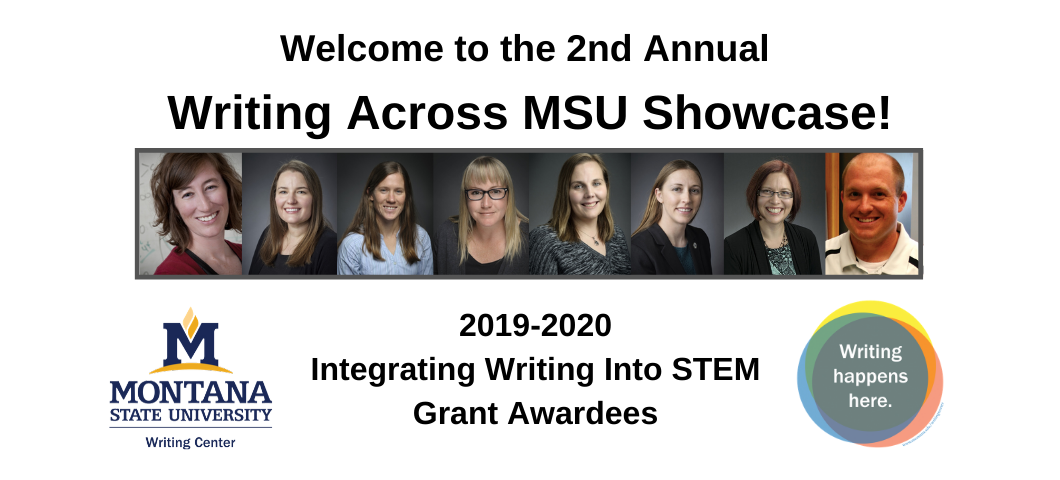
The following is a report of the 2020 “WAMSU Showcase” during which the work of the Faculty Fellows was shared with the larger community. Thank you to all the Faculty Fellows for their work and dedication in integrating writing into their courses!

Jennifer Brown
Associate Professor of Chemical and Biological Engineering
Stephanie Wettstein
Associate Professor of Chemical and Biological Engineering
Improving Report Writing in Chemical and Biological Engineering
For Drs. Stephanie Wettstein and Jennifer Brown, both associate professors in the Chemical Engineering Department, the two senior-level Chemical Engineering Unit Operations laboratory courses (ECHM442-443) were the perfect site to imagine improvements to the way writing was integrated into their program. The lab series enrolls almost 100 students in consecutive semesters each year, and effective communication is the primary learning outcome of the course sequence.
They knew they needed to integrate more effective technical writing assignments into the course design in order to better meet the Accreditation Board for Engineering and Technology (ABET) assessment and course learning outcomes. More importantly, they wanted their students to be better prepared for the communication demands of their careers.
Students were offered extra credit throughout the fall semester to book sessions with Writing Center tutors as a group to clarify the purposes of their experimental plans and seek feedback on the effectiveness and execution of their experimental reports. In the spring, individuals were required to book at least one session with a Writing Center tutor, who offered them tools for giving and receiving effective feedback and facilitated a peer review. Many groups and individuals scheduled repeat sessions after the initial required visit.
We in the Writing Center have learned immensely from our partnership with Drs. Wettstein and Brown. We asked them to reflect on their experience and have included their answers to our questions below.
Writing Center: What motivated you to integrate writing into your STEM course?
Stephanie Wettstein: I wanted to better understand what [the Writing Center] offered. In the fall of the year I offered extra credit, someone from the Writing Center came in, and I felt like I was only scratching the surface of what there is to be offered. In the end, it was partly to benefit me in the sense of understanding what kind of resources [the Writing Center] had.
Jennifer Brown: The course is a senior level required laboratory course with a primary objective to improve communication skills in chemical engineers. We felt the course was not serving our students as well as it could, especially since they were soon to enter the workforce. We wanted their writing and communication skills to be directly relevant to skills they would need in their careers. As faculty in engineering, however, our training is not in teaching or assessing writing. Collaboration with the Writing Center was an ideal way to help us effectively integrate writing skills into the course.
WC: Describe the writing assignment/experience you designed for your class.
SW: We have to write reports. That’s what all chemical engineers have to do in [graduate] programs and undergrad. I thought, “but why?” Industry doesn’t want a fifteen-page report, so let’s start thinking about having very targeted reasons for why we’re doing what we’re doing. The one thing I felt [I gained from our faculty workshops that] was really useful was the realization of “why are you having them do this?”
JB: Effective communication is a primary outcome of the course, so there are several writing assignments. In this laboratory-based course, the students are expected to design experiments, collect data, analyze data, and draw conclusions. To mirror their future professional lives, we created a scenario where the students are employees at a consulting company and each experiment is a project for a client. After designing an experiment, the students are required to write and orally present a proposal, explaining their design to their supervisor and asking for approval to move forward. Once approved, they run the experiment and write a technical report. With these assignments, they have to be aware of the purpose of the writing and write to the correct audience. After reflection on what we as instructors valued in the writing (what we wanted the students to learn), the rubrics were completely revised. We created rubric categories and point distributions to reflect the values of clarity, concision, accuracy and precision in technical writing as well as an ability to identify relevant information. In addition, several homework assignments, tied to workshops facilitated by the Writing Center, were designed to further develop the valued skills.
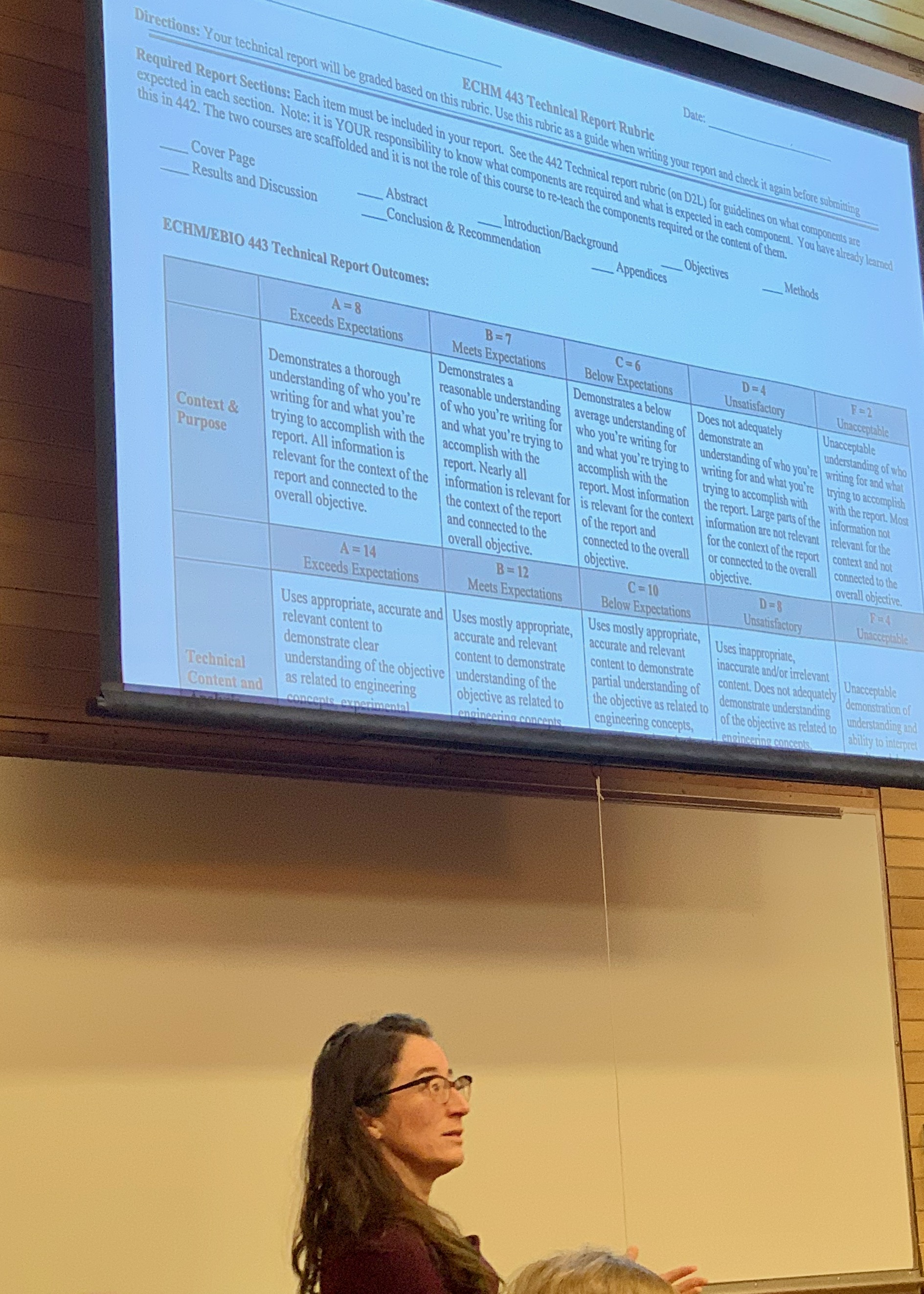
WC: Why did you decide on that particular writing experience?
JB: Due to the nature of the laboratory-based required engineering course and the associated learning outcomes, the technical report is a required component. However, the course structure and format of the report had not been updated in over twenty years. In addition, as instructors we had traditionally focused on teaching the students how to design and run the experiment rather than how to effectively communicate. We wanted to redesign the writing assignments to be more effective and improve how we taught and assessed writing in order to better meet our learning outcomes of improving communication skills.
WC: What have you learned about integrating writing into your curriculum from this experience?
SW: For me, I’ve changed the focus to teaching [the students] to write so they are better set for industry and future careers. Writing has always been integrated into this class, but I wanted to focus on purposeful writing.
JB: Through the collaboration with the Writing Center, I have been able to identify what I truly want my students to learn with respect to technical writing, i.e. what I value in communication and what skills will be valuable in their careers. With the Writing Center's support, I feel better equipped to effectively teach these valued skills and assess based on these values.
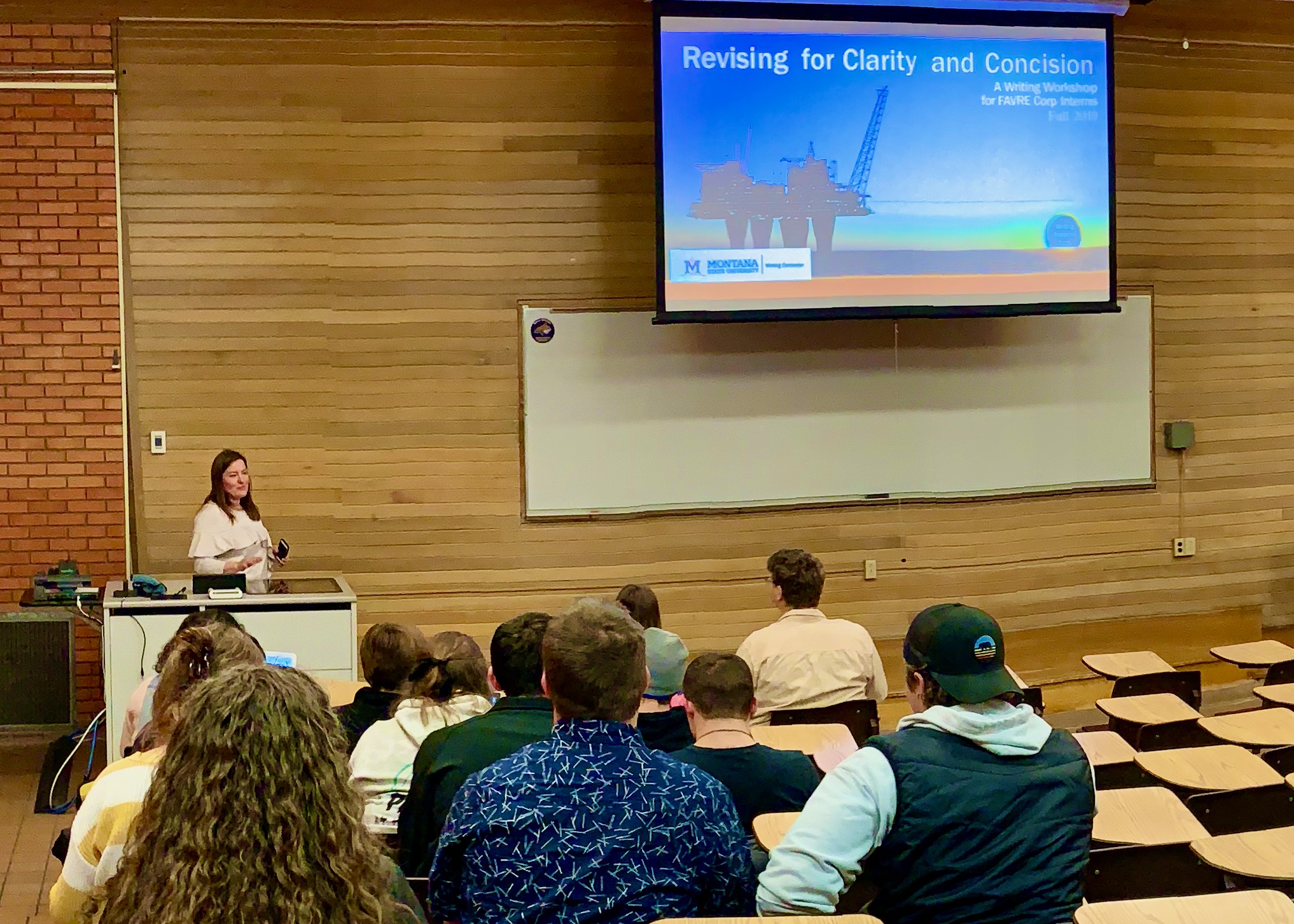
WC: What else should faculty know about your experience?
SW: The year I got involved in the Writing Center, I realized I was never trained in writing, so we should send [our students] to someone who is trained in writing. I felt like that’s where I thought, “Okay, how do I sell this idea or how I am thinking about writing?” That’s where this grant, Integrating Writing into STEM, really helped me out.
JB: This was a great opportunity for interdisciplinary collaboration. I learned a lot about technical writing and my own writing process through this experience. I feel that what I've learned will be relevant beyond an individual undergraduate course. I see applications not just in my teaching but also in activities around scholarship and graduate education.
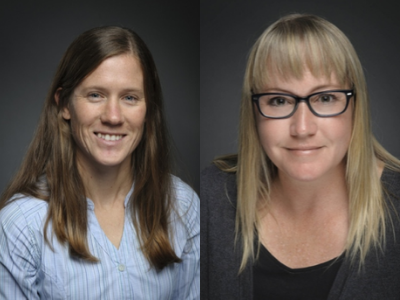
Ellen Lauchnor
Assistant Professor of Environmental Engineering
Adie Phillips
Assistant Professor of Environmental Engineering
The primary goal for Drs. Lauchnor and Philips was to design writing assignments in two required 300-level courses in the new Environmental Engineering major. Their aim was to improve the quality of students’ writing prior to their senior year capstone projects and better prepare them for the specific types of report and grant writing required of professional engineers. Incorporating in-class workshops and tutor-facilitated Writing studios added a layer of support for students in both courses.
The Environmental Engineering faculty at MSU are just completing their first academic year as an official degree program within the Civil Engineering department. Innovative, forward-thinking faculty within the program, like Drs. Ellen Lauchnor and Adie Phillips, both Assistant Professors, are piloting curricula to meet the needs of industry and satisfy the standards of the Accreditation Board for Engineering and Technology (ABET).
The Writing Center has been fortunate to be a part of this unique opportunity to incorporate writing assignments in two courses in the new Environmental Engineering curriculum: Dr. Lauchnor’s Fall 2019 EENV 341: Physical and Chemical Treatment Processes and EENV 387: Environmental Laws and Regulations, taught by Dr. Phillips in Spring 2020.
Students in both classes participated in tutor-facilitated writing studios. Studios are comprised of small groups of students who help each other draft, revise, and polish their work. Writing Center tutors guide students through their writing processes, from idea generation and experimental design, through research, drafting, peer revision, and proofreading. While students began the spring semester meeting face-to-face, when that was no longer an option due to the outbreak of Covid-19, they were still able to provide feedback and support to one another online in asynchronous studios.
We are extraordinarily grateful to be on this program-development journey with Drs. Lauchnor and Phillips. We asked them to reflect on their experience working with the Writing Center to integrate writing into EENV 341 and EENV 387.
Writing Center: What motivated you to integrate writing into your STEM course?
Ellen Lauchnor: We have a new degree (Environmental Engineering) in which we are hoping to find innovative ways to teach students non-engineering skills, including writing. This was an excellent opportunity to try a new approach instead of simply requiring more WRIT courses.
Adie Phillips: Environmental engineers need to be able to communicate well for a wide variety of audiences. I wanted to help our students know the value of clear communication and writing in their future careers.
WC: Describe the writing assignment/experience you designed for your class.
EL: My assignment was centered around water quality testing and designing a water treatment system. The students had to write a report summarizing their water quality testing of a local waterway and their ideas for designing a treatment process for that water.
AP: With the help of the Writing Center, I re-imagined the homework and term project for the class. In the first homework, we practiced writing a well-designed résumé and cover letter to emphasize communication with potential employers. In the second homework, we prepared a concise summary of an environmental regulation to an audience such as a client at a manufacturing facility. In the re-designed term project, the students were charged with developing a summary of a climate change adaptation project that required communication with a city council and the public, with the goal of preparing written or oral communications that would convince the public of the need for the project. The theme of the assignments was to tailor writing styles for the various audiences while practicing the technical writing values of the ABCS (accuracy, brevity, clarity, and simplicity).
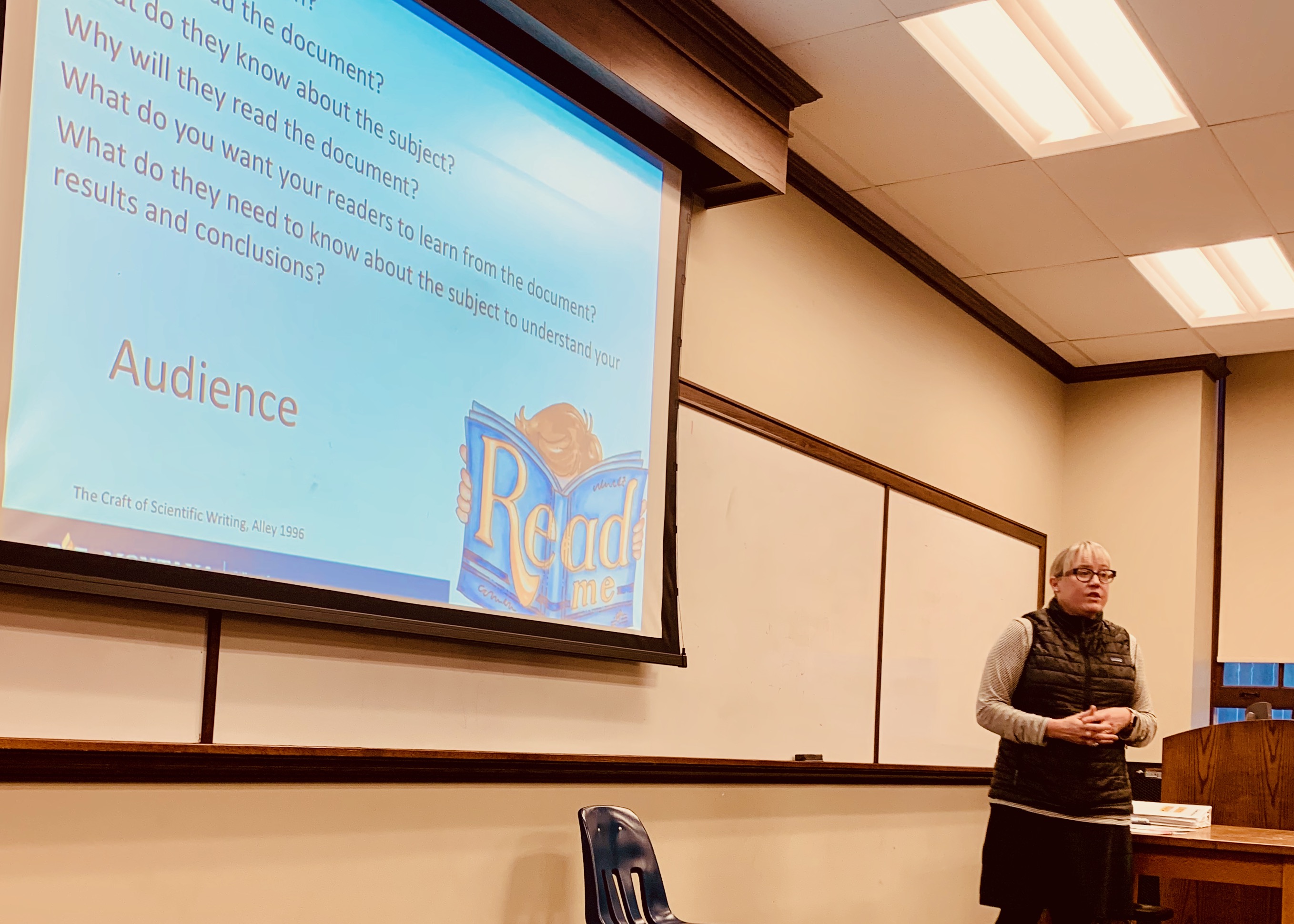
WC: Why did you decide on that particular writing experience?
EL: It was closely related to the type of writing our students may have to do in the professional world. It was also closely tied into the technical content that they were learning in the class and was similarly formatted to the type of report that they will have to write for their senior capstone project.
AP: My partner in this project, Dr. Ellen Lauchnor, was emphasizing technical communication to technical audiences, so my projects were focused on communication to less technical audiences.
WC: What have you learned about integrating writing into your curriculum from this experience?
EL: I have learned much about the resources offered by the Writing Center and about strategies to make the assignments and students' efforts more fruitful and meaningful. It has certainly given me many ideas about how to use writing assignments to teach students peer reviewing skills, how to review their own work, and how to write for a specific audience. It has shown me that incorporating writing isn't easy and that there is still a lot of effort involved with evaluating and helping students to understand the importance of writing in their field.
AP: I think the biggest lesson I learned is that "less is more." More frequent feedback (and input from their peers) on fewer assignments has improved the writing and feedback process.
WC: What will you keep and what will you revise for the next iteration of your class?
EL: I will keep a similar assignment for my class next year, incorporating a written technical report into their project. Instead of the studios, I will have the students spend a couple of days in class practicing peer review. In all of my classes moving forward, I will incorporate some of the approaches we discussed, such as assigning partial drafts due early in the semester and having peer review exercises. I would like to somehow encourage the students to form writing groups outside of class for their assignments and have been pushing my graduate students to do this for their thesis writing. I will have writing assignments in all of my courses moving forward.
AP: This semester was going so well before the pandemic transitioned us online. I am hoping it continues to be so collaborative online. Before the shift, the students were really taking part in the studios and in-class workshop/peer reviews. So, yes. I am planning to keep my changed assignments and structure for the next spring course.
WC: What else should faculty know about your experience?
EL: All STEM courses should incorporate writing. It's an incredibly important skill for every profession, and students should get practice in all of their courses! I think the most important thing that I learned is that writing is a process and students won't put in the time they need to polish the work if you have just a single due date. Assigning draft submissions is the single modification that has greatly improved the quality of all the reports I've read from my classes this year. We don't need to be writing teachers and can incorporate very simple modifications to our assignments to teach concepts like reviewing and revision that are important for students to practice and carry forward into their professional lives.
AP: I felt so supported and cheered on with my changes to my course by the MSU Writing Center. I now feel like I am part of the campus writing community. I learned a lot from our workshops and lunch meetings. I learned so much from Writing Center staff and also from our workshop peers who were re-designing assignments. I encourage all faculty to write the proposal and join the WAMSU team. As we discussed in our lunch meetings, I think we should develop a technical writing certificate for our students to carry with them into their futures. Thank you, MSU Writing Center!!
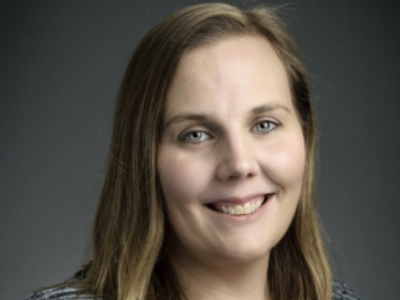 Jennifer Thompson
Jennifer Thompson
Associate Professor of Livestock Genomics
Dr. Thomson’s goal was to revise the existing writing assignments, processes, and grading instruments in Livestock Genetics and Breeding. While crafting Extension Bulletins, her students focused on writing multiple drafts for specific audiences, as well as utilizing a broader range of tools to integrate research and peer feedback into their writing.
Shaping the Writing Process with Assignment Design
For this year’s Integrating Writing into STEM teaching grant, Dr. Jennifer Thomson, Associate Professor of Livestock Genomics, focused on a 300-level course at the heart of the Animal Sciences program: Principles of Animal Breeding and Genetics (ANSC 322).
This course is required for all Animal Science majors and an elective for the interdisciplinary Genetics minor. Animal Sciences graduates are expected to critically evaluate technical content to make informed decisions, demonstrate effective written communication to a range of audiences and within collaborative environments, and use scientific principles to solve real-world problems and advocate for science-based solutions.
With these outcomes in mind, Dr. Thomson worked with Writing Center staff on assignment design to find ways to incorporate more significant writing in a course with nearly 60 students.
We collaborated to reduce the number of writing assignments, opting for quality rather than quantity; to select a real-life genre so students could target specific, real-life audiences; to focus more time and attention on writing process; and to make space for writing-specific instruction.
The Writing Center staff facilitated two in-class workshops during the semester, one on how to responsibly incorporate source material and another on revising for clarity and concision.
Dr. Thomson also encouraged students to schedule face-to-face sessions with a Writing Center tutor at any point in their process.
Dr. Jennifer Thomson showed us so much about writing in Animal Sciences this year. She reflects on her experience here.
Writing Center: What motivated you to integrate writing into your STEM course?
Jennifer Thomson: I previously had quite a bit of writing in my Animal Genetics course, but the quality was low and grading was painful.
WC: Describe the writing assignment/experience you designed for your class.
JT: I designed assignments around writing an Extension report similar to the Montguides, published by the Montana Experiment Station Extension program. My students wrote three drafts related to different course objectives and then picked one to expand and polish as their term paper.
WC: Why did you decide on that particular writing experience?
JT: It was something that my students were familiar with. There was a well-defined audience. It required them to translate scientific information to a producer or layperson and develop a deeper level of understanding of the material than just summarizing the research for an academic audience.
WC: What have you learned about integrating writing into your curriculum from this experience?
JT: I have learned that the quality of the assignment directly impacts the quality of the writing from the students. In addition, when students can see the value of what they are writing and how it could be used, they are more engaged in the process.
WC: What will you keep and what will you revise for the next iteration of your class?
JT: I will be utilizing this model and assignments in my classroom and course next spring and am working on adapting them to my online course this summer.
WC: What else should faculty know about your experience?
JT: Student writing is of better quality and they are more engaged in the writing process when they see the value of the end product beyond just getting a grade.
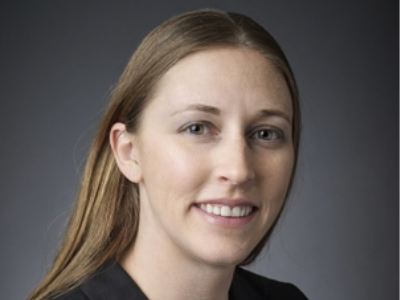
Bernadette McCrory
Assistant Professor of Industrial & Biomedical Engineering
Dr. McCrory proposed improvements to a multi-draft technical report that required students to explain, evaluate, and apply their statistical analyses to draw conclusions. Her goal was to improve Engineering students’ written communication by inviting Writing Center tutors into the classroom throughout the semester to workshop their writing towards professional, clear, concise, and evidence-based statistical narratives.
“Don’t Just Data Dump!”
Integrating Technical Writing into Engineering Statistics
Through the Integrating Writing into STEM grant program, Assistant Professor of Industrial Engineering, Dr. Bernadette McCrory, partnered with Writing Center staff to rethink a semester-long technical report in her Engineering Probability and Statistics (EIND 354) course in the Fall of 2019.
The project required students, working in groups, to think critically about a wide range of data sets found in everyday contexts such as trends in ages of women having first live births, immunization rates around the world, or how keywords in job titles relate to salary. Students had to communicate their interpretations in their own language rather than simply repeating statistical terminology. In writing, they had to explain, evaluate, and apply statistical analysis in order to draw conclusions.
With almost 50 students in the course, Dr. McCrory recognized the need to build in support for the writing process for her students. Early in the semester, Writing Center staff delivered a presentation detailing the realities of the writing processes of engineers. Then tutors joined the students on three different project work days to assist in planning, incorporating instructor feedback, developing and arranging ideas, integrating and citing research, revising, and proofreading group papers.
Many groups returned to the Writing Center throughout the semester to polish their reports, often booking the same tutors they’d worked with in class.
We enjoyed learning with Dr. McCrory and her students about data and technical writing. Below, she reflects on her experiences.
Writing Center: What motivated you to integrate writing into your STEM course?
Bernadette McCrory: Personal experience and personal struggle. Engineers aren't typically thought of as "writers" but for me—being public health, healthcare, and engineering—I have found an intense need for competent technical writers. It is crucial to convey appropriate meaning, particularly during times of upheaval. If we look at COVID-2019/SARS-COV-2, we see risk communication everywhere—good and bad, fact- and opinion-based. How can one interpret this? Technical writing, for me, is the saving grace in this pandemic—sharing unbiased facts of risk to empower individuals.
WC: Describe the writing assignment/experience you designed for your class.
BM: Took a second iteration term project and made it more bounded for better conception by my students. Integrated TAs/Graders/Writing Center Staff to help create a "writer's focus and identity."
WC: Why did you decide on that particular writing experience?
BM: Introductory Statistics is often boring—too many proofs. For engineers, we want everything to be applied to garner a new skill set. So, taking a raw public data set and making it their own seemed like a great new adventure to teach basic statistics. How better to show application than to struggle with minimal stats tools and minimal writing and research skills to produce a truly good analyses on a topic! These students rock! It's not easy. Also, my students submitted 9 NCUR proposals from this course!
WC: Describe the support your students received through the Writing Center.
BM: YAY! OF COURSE! I couldn't do it without you all. Time is crucial and I don't have enough to meet individually with 50 students every week in this course. I could not do this without peer tutor support.
WC: What have you learned about integrating writing into your curriculum from this experience?
BM: It's hard. Time consuming. Painful. Joyous! Doesn't stick. Need more practice for the students. Drinking the "Kool Aide" takes more than one class or one semester. Encouraging. My pain and suffering are leading to their learning and growth, leading to better outcomes in capstone, thus leading to better power skills on the job market. It's worth it.
WC: What will you keep and what will you revise for the next iteration of your class?
BM: I will attempt to keep everything. We were very thoughtful on integration. My hope is to continue to use peer Writing Center tutors—but also to integrate my own graduate students. I see this as my sustainable option for integration of peer support.
WC: What else should faculty know about your experience?
BM: I learned a lot. I thought I had a good grasp in [writing instruction]—I did not.
It helped me 'reflect' on what I intended versus what I communicated.
I also had the fortune of a grad student working on her research having been through the experience with me, so she could provide both a student- and research perspective without judgement/bias. I value this immensely as we are still working together, and this project has grown into her thesis!
As a program, we have really started discussing what we want for technical writing and how to improve. We have hard conversations about the skills we want our engineers leaving with.
We have published! We are working towards a larger grant proposal.
I also learned that while I want everything to serve a purpose and be "quantitative,” it’s okay if it's not—it leads to experience and enables experiential learning.
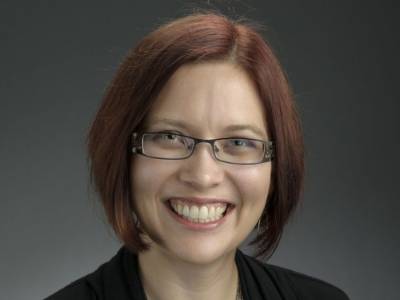 Nicole Carnegie
Nicole Carnegie
Assistant Professor of Statistics
Dr. Carnegie set out to apply the same careful thought and planning that is given to the statistical content to writing instruction in the upper division Applied Statistics core. Her goals were to refine the course’s major writing assignment, a statistical report, to make space for active instruction in writing. She also incorporated tutor-facilitated Writing Studios to support her students through their writing processes.
Building Critical Communication Skills in Statistics
For statistician and Assistant Professor of Statistics, Dr. Nicole Carnegie, solid technical writing skills are critically important for anyone using data to make a point. “It is not enough to know how to run a regression; a student must understand what it means to be running that regression and be able to interpret the output and clearly convey the results,” Carnegie writes.
Dr. Carnegie identified the Applied Statistics sequence (STAT 411/412) as a significant site where students develop their ability to communicate technical results in writing. It serves STEM majors across campus, from Conservation Biology and Ecology to Math with Teaching options to Snow Science, Environmental Health, GIS/Planning, Environmental Analysis, Finance, and Geography. The course is co-convened with the respective graduate course (STAT 511/512).
The goal for Methods for Data Analysis II, which Dr. Carnegie taught in Spring 2020, is to move students beyond understanding the core concepts of statistics, such as sampling and uncertainty, to applying that knowledge.
Dr. Carnegie worked with Writing Center staff to modify a large data-analysis project. Together we developed sustainable assessment techniques that would be more efficient for instructors and teach students essential technical writing skills, such as working all the way through their writing process, thinking critically about audience, working graphics into written reports effectively, and seeking and providing peer feedback.
Tutor-facilitated writing studios, held every other week throughout the course, modeled writing as a collaborative, social activity where students could work through the messiness of their writing processes, practice giving and receiving feedback, learn about their own writing, and produce a more polished product.
We are excited about future collaboration with Dr. Carnegie and her colleagues because we learned so much from the process. Here are her reflections on the experience of integrating writing into her course.
Writing Center: What motivated you to integrate writing into your STEM course?
Nicole Carnegie: Writing is critically important for statisticians—data analyses don't speak for themselves to most audiences, so our students need to learn to communicate with a wide variety of folks.
WC: Describe the writing assignment/experience you designed for your class.
NC: We developed a scaffolded, semester-long data analysis and reporting project. Students chose a data source and question, as well as an audience to whom they are trying to communicate their results (e.g. scientific journal readers or a consulting client). The assignment was broken down into stages—choosing question and audience, writing background and introduction, developing an analysis plan, writing conclusions—with review at all stages.
WC: Why did you decide on that particular writing experience?
NC: It encapsulates the type of communication skills I want the students to develop and also gives them the experience of working through the process of developing a question, choosing statistical approaches, data cleaning, etc. The types of examples they work on in class don't generally reach this depth of thought.
WC: Describe the support your students received through the Writing Center.
NC: The students had writing studios, first in-person and then online, each with 4-5 class members and a writing tutor. It provided them a place to discuss the assignment and the stages of their drafts with some writing-focused guidance and without the pressure of being evaluated by me.
WC: What have you learned about integrating writing into your curriculum from this experience?
NC: I am learning how to incorporate writing efficiently –my tendency in the past has been to assign more writing than I have the capacity to process and respond to. Incorporating peer review helps the students learn more about their own writing and can ease the burden for the instructor—a win-win!
WC: What will you keep and what will you revise for the next iteration of your class?
NC: I will keep the basic structure of the assignment and would love to keep the Writing Studios for students. I might think about adjusting peer review processes and my feedback processes for supporting students—not an area I've been terribly successful in, even with the support and suggestions from the lovely Writing Center folks.
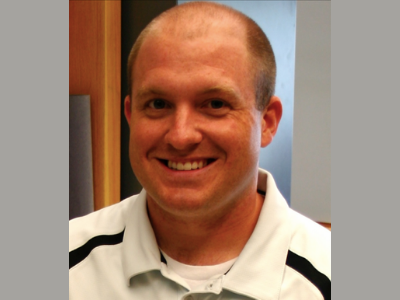 Marc Mergy
Marc Mergy
Instructor of Cell Biology and Neuroscience
Dr. Mergy has worked with the Writing Center for three semesters. This past fall, he added tutor-facilitated writing studios to his 80-student Biomedical Genetics course. His goal was to help students better communicate complex scientific information to non-scientists through repeated peer feedback and regular checkpoints that allowed for low-stakes conversations with classmates.
Providing Ongoing Writing Experiences Throughout a Student’s College Career
Last year, Dr. Marc Mergy, a 2018-2019 Integrating Writing into STEM grant recipient, was instrumental in building a successful partnership with introductory biology (BIOB 260) courses. Through his work with Drs. Haley Dunkel and Christa Merzdorf, over 500 students participated in tutor-facilitated, in-class writing groups, collaborating with tutors and peers to refine lab reports and article summaries.
Building on that success, Dr. Mergy collaborated with the Writing Center again this year, providing the opportunity for his students, many of whom were in the BIOB 260 class last year, to broaden their thinking about the types of writing experiences they might encounter as a scientist.
One of Dr. Mergy’s personal and professional values is communicating effectively with different audiences. His “Genetics in Society” assignment arose out of that value and was sparked by a presentation at last year’s WAMSU Showcase. He reconfigured his Biomedical Genetics (BIOH 320) course to include both an essay and presentation tailored to general audiences, creating the opportunity for students to engage in thinking through how scientists effectively communicate to a public audience. Throughout the semester, students participated in writing studios facilitated by Writing Center tutors and could consult with Fellows, former students who offered tutoring in content development.
In Spring 2020, Dr. Mergy continued to build on the foundations he had begun in earlier courses. In his Neuroscience of Mental Illness (BIOH 440) course, he created a simulated grant-writing experience for his students with an optional one-credit writing studio component. Students who chose the studio option would meet an additional hour each week to share their work through the writing studio model. Nearly all of his students (many now in their third semester with Writing Center support) took advantage of the optional studios.
Through his ongoing partnerships with the Writing Center, Dr. Mergy has demonstrated what can happen when faculty provide a variety of writing experiences and opportunities for students as they move through their University careers. Below he reflects on his experience partnering with the Writing Center.
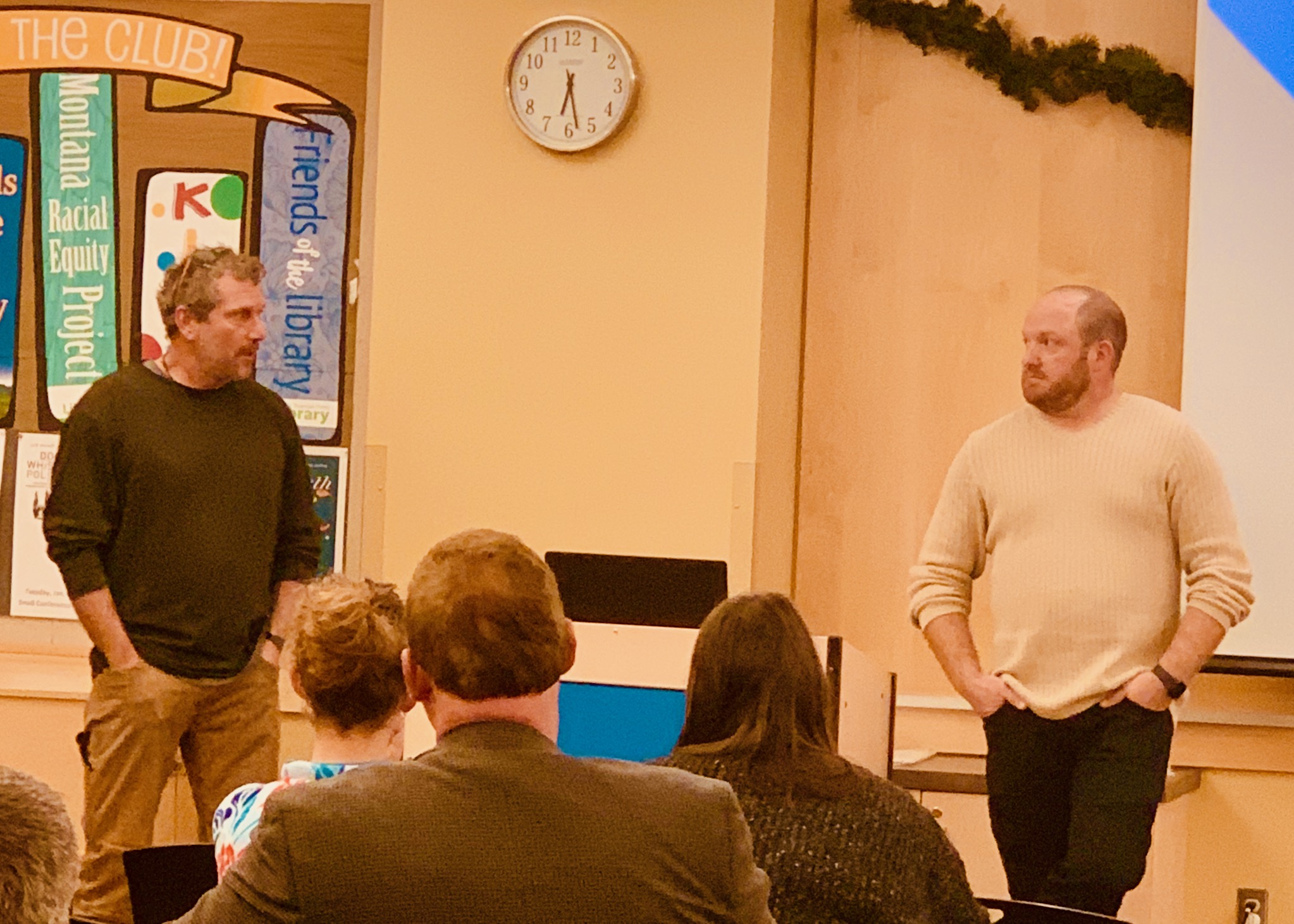
Writing Center: What motivated you to integrate writing into your STEM course?
Marc Mergy: My motivation was threefold. First, in my own undergraduate experience (small liberal arts college), writing was incorporated into all of my classes. It seems like a normal part of the educational experience to have written communication as a part of college classes. Second, in my professional life (graduate school and as a post-doc and instructor here at MSU), I realize that there is a lot of written communication across several genres—for example, professional messages to colleagues and collaborators, scientific publications, and day-to-day communication with coworkers and students. I recognize that effective communication is a skill and that I have had practice and guidance to hone my own proficiency in written communication. And third, in my years of teaching at MSU, I have come to realize that students are often poor writers, but also rarely have the opportunity to develop their genre-specific writing skills.
WC: Describe the writing assignment/experience you designed for your class.
MM: For my [Fall 2019] class, BIOH320 Biomedical Genetics, students had to research a subject rooted in genetics that is also relevant to the general population, then write a brief (2-page) essay explaining their topic and why it is worth public attention. The written assignment, however, was to be written for a general audience (like an NY Times Science Times article), not someone with science experience (a professor, or even a classmate). Then, students had to convert their essay into a brief oral presentation (3 minutes) delivered in front of the class.
WC: Why did you decide on that particular writing experience?
MM: Most of the students in my class were fairly comfortable with technical writing—lab reports, for example—that required them to research a subject and write about it. The students were able to write about complicated subject matter and show their own mastery of the material. However, communication of scientific information, especially to non-scientists, is also important. And a very different skill from the type of scientific writing that the students were used to doing.
WC: Describe the support your students received through the Writing Center.
MM: My students participated in a hybrid writing process that included a required Writing Studio for their assignment as well as aid from Writing Fellows (former students that had content knowledge and were also excellent writers). All studio meetings were facilitated by the Writing Center. These meetings allowed students to repeatedly get peer feedback and gave them a more concrete timeline for engaging in the writing process. Many students reported that the organized timeline and regular checkpoints for the writing assignment, as well as low-stakes conversations with classmates were extremely helpful.
WC: What have you learned about integrating writing into your curriculum from this experience?
MM: In a large-format course (my class was 80 students), integrating a writing assignment can be done, but it takes some extra effort and lots of support. It would not have been possible to have Writing Studios without the Writing Center. Also, in designing my assignment, the Writing Center provided invaluable advice in helping me downsize other assignments and course requirements (quality instead of quantity) so that the writing assignment was not overly burdensome (for the students, or for me!).
We also learned that Studio groups do not require a scientific content expert present at each group meeting. The Writing Center facilitators are, generally, not from science backgrounds, but they know how to discuss writing and how to facilitate group meetings to have productive conversations about writing. However, by having meetings with classmates, the students served as each other’s content experts and were able to help each other troubleshoot technical aspects of their assignments.
WC: What will you keep and what will you revise for the next iteration of your class?
MM: [If I were teaching the same classes next year], I'd keep the assignment more or less intact. Challenging students with a new genre of writing (general audience rather than technical) resulted in many very interesting and well-written papers. In addition, the short presentation challenged students to consider effective communication more generally; students really had to consider what information was most important to convey to an audience and tell their story. As for revisions, I would skip the writing fellows component. They were not utilized extensively, and students were able to rely on each other and me for content help. I would also be even more up-front and straightforward about the rationale for the assignment. When the students realize that the skills developed in doing this assignment have lifelong application, professional or otherwise, they tend to "buy-in" and make a genuine effort to do well.
WC: What else should faculty know about your experience?
MM: There are always trade-offs when you choose to add a writing assignment. For example, in my class, I gave up 2+ weeks of lectures in order to make time to have presentations in class. I could have covered a couple more chapters from the textbook, but I think the benefit from a writing assignment outweighs a bit more content knowledge gained from more lectures. Be prepared to alter your course schedule in order to accommodate a new assignment. The other thing for other faculty to keep in mind is that the Writing Center does an excellent job working WITH you to design and support assignments that meet your goals. They do not have a particular writing agenda, but rather want to support you and your students in tackling a realistic writing assignment.
